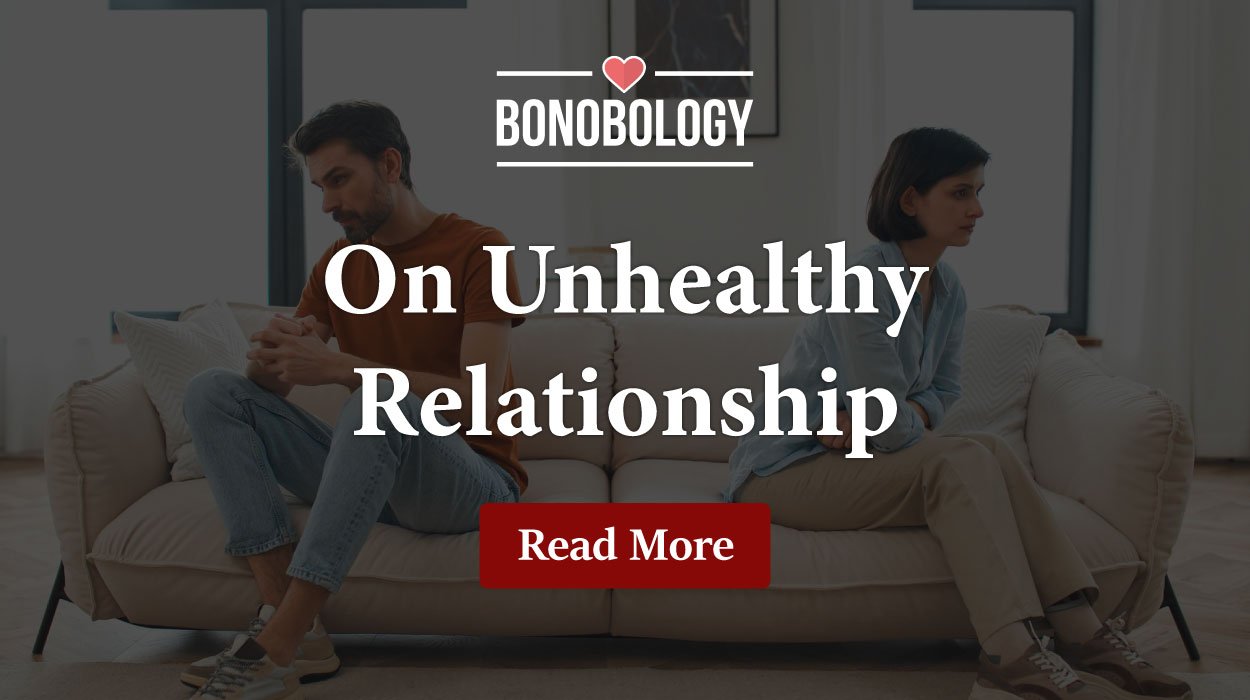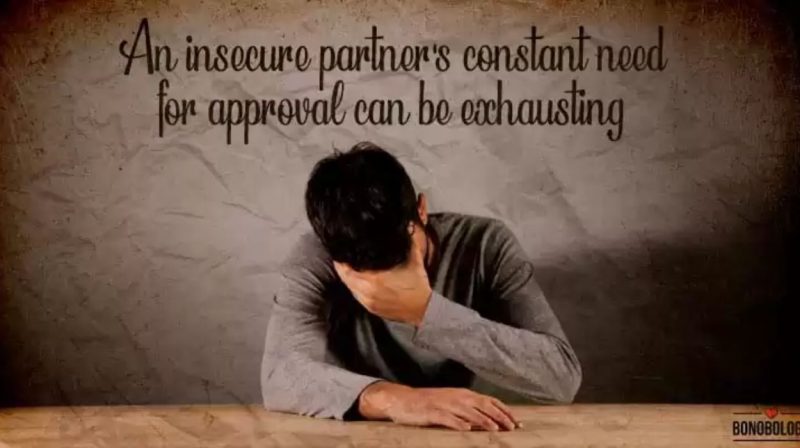An insecure partner drains relationships in a variety of ways. Insecurity can manifest in many forms, such as jealousy, possessiveness, lack of trust, and constant need for reassurance and validation. An insecure person may not be able to compromise or maintain effective communication, creating a lack of intimacy and connection in romantic relationships. They may also struggle with feelings of inadequacy. All of these behavior patterns can leave their partner feeling emotionally exhausted and overwhelmed.
Besides, the lack of self-esteem and self-worth, which is often the root cause of insecurities, can put a strain on the relationship, making it increasingly difficult to foster a healthy connection. The only way to move past these hurdles and build a supportive and trusting relationship is to learn to spot signs of an insecure partner and overcome the unhealthy patterns that stem from insecurity.
With insights from relationship management expert, Jyoti Dadlani, let’s delve deeper into the intricacies of insecurity in a relationship and figure out how to manage them effectively. She says, “Every relationship is different and every person’s insecurities can vary. Even so, some common patterns emerge when one is feeling insecure in a relationship. The only way to get past them is to cultivate the self-awareness of where those stem from.”
The Impact Of Insecurity On Relationships
Table of Contents
A study published in the Journal of Social and Personal Relationships found that people who feel insecure in their relationships are more likely to experience dissatisfaction, jealousy, and mistrust with their partners. Insecurity can be defined as a feeling of self-doubt, inadequacy, and uncertainty in oneself, and a mix of these characteristics can be a recipe for a toxic relationship, owing to the following behavioral traits of an insecure partner:
- Jealousy, mistrust, and resentment
- Manipulative, demanding, or controlling behavior to allay the above feelings can perpetuate a cycle of insecurity
- An insecure person may also question their partner’s loyalty, love, and commitment
Here are two scenarios to show you how insecurity manifests in relationships:
- Imagine a person who is insecure about their appearance. They may constantly question their partner’s attraction to them and may become jealous of their partner’s interactions with others. This can lead to serious trust issues and their partner may feel suffocated and helpless
- Another example is a person who is insecure about their financial stability. Insecure partners may constantly wonder if their partner is attracted to them or their money. Or, they could be jealous of their partner’s financial success. This can make the latter feel frustrated and unappreciated
Thus, an insecure partner drains a relationship by swirling up a tornado of unhealthy patterns which leads to a loss of intimacy, respect, and trust between partners. This can ultimately blow a relationship to bits.
Related Reading: How To Stop Liking Someone – 13 Helpful Tips
5 Signs Of An Insecure Partner
In relationships, insecurity can manifest in a variety of ways that are difficult to identify. It has the potential to create negative patterns in relationships, creating tension, worry, and discomfort for both partners. Understanding the signs of an insecure partner is crucial in improving the relationship or in deciding to end it.
1. They have a fear of abandonment

Humans tend to think ten steps ahead and plan for worst-case scenarios. It’s also not unusual to wait for the other shoe to drop whenever something good happens in their lives. But constantly asking one’s partner for assurances that they will stick around indicates abandonment issues. This is one of the most common signs of an emotionally draining person.
2. An insecure partner struggles with trust issues
It’s no surprise that an insecure partner drains a relationship. Trust is the foundation of any healthy relationship, but an insecure partner may struggle with trusting others, including their significant other. What are some of the common actions of a person with trust issues?
- Constantly questions their partner’s actions
- Suspecting them of cheating
- Constantly asks for reassurance of love and commitment
- Checks their partner’s phone, emails, or social media without consent
- Being overly possessive or controlling in relationships
- Refuses to give their partner the benefit of the doubt
- Being quick to jump to negative conclusions about their partner’s intentions
This research concluded that a lack of trust in romantic relationships can lead to more problems, such as emotional instability, conflict, and even the intention to break up.
3. Possessive and jealous behavior
Possessiveness and jealousy are some of the most common traits of insecure partners. They may feel threatened by their partner’s friends, colleagues, or even family. Jealousy and possessiveness can escalate quickly and can be signs of an emotionally draining relationship. Some other things an insecure partner might do in a relationship:
- Micromanage their partner’s behavior as they perceive their partner’s contact with others to be dangerous
- Try to know their partner’s every move and become angry or upset if they spend time with anyone else
- Try to isolate their partner from their support system, making it harder for them to maintain other healthy relationships
- May throw baseless accusations of being unfaithful or flirting with others
4. Being highly critical
Insecure partners may also engage in harsh criticism and negative comments. They may point out their partner’s flaws, criticize their choices, or make negative comments about their life. This type of behavior is a sign of their own insecurities and the need to control or dominate the relationship. This can be damaging to your self-esteem and can create a toxic dynamic in the relationship.
Related Reading: 11 Relationship Arguments That Spell Doom For Your Bond
5. Your insecure partner depends on the relationship for their self-esteem
Don’t get confused between a partner who wants your love and support to co-regulate their mental/emotional health and a partner who depends on the relationship entirely to maintain their self-esteem. A person with this trait will rely on the relationship completely to feel good about themselves. This dependence can put a lot of pressure on the other partner and make it difficult for them to have a balanced and healthy relationship.
According to Jyoti, acknowledging the presence of insecurity in yourself or your partner is the first step to understanding what an insecure partner looks like. She says, “Don’t try walking on eggshells around them after spotting these signs, whether it be due to fear of self-reflection, or to avoid a fight, or due to a fear of ruining the relationship. Insecurity has a cunning way of hollowing out a relationship faster than you realize, so take action now.”
11 Ways An Insecure Partner Drains A Relationship
Although insecurity is common and can take many forms, it always results in sapping the vitality and joy of a relationship. To build a happier and more meaningful bond, it can be helpful for both partners to recognize and address the problem. Is your boyfriend or girlfriend emotionally draining you? Does your spouse leave you feeling emotionally exhausted? Or do you find yourself thinking, “I don’t feel secure in my relationship,” and then act in ways that you later regret? To be able to deal with any of these patterns, you need to understand how an insecure partner can damage a relationship.
1. An insecure partner’s constant need for approval can be exhausting
Imagine being on the receiving end of someone who is constantly worried about receiving validation and reassurance from you. This can make the other partner not only feel drained and frustrated but it can also mark the onset of resentment in the relationship. How does it drain a relationship?
- One partner’s constant need for approval can create an imbalance of power and make the other partner feel overly responsible for the former’s happiness
- It can also result in a decrease in intimacy and communication in the relationship, leading to a breakdown of trust and connection
- Most importantly, it can negatively impact the self-esteem and confidence of both partners, causing additional stress and harm to the relationship
2. Lack of trust can cause unnecessary fights
Relationship insecurities and lack of trust go hand-in-hand. If you don’t have faith in the other person, it could be difficult to establish a successful connection. The constant suspicion and questioning can lead to feelings of insecurity, guilt, and blame, which can cause frequent arguments. Let’s take a look at some instances where a lack of trust can drain a relationship and have a significant negative impact on the relationship dynamic:
- Imagine answering a hundred questions for your partner before heading out for a simple girls’ night out. It’s exhausting. This lack of trust is not the same as concern for your well-being and safety
- Or imagine your partner not trusting you that you love them or that you’re happy with them
- Lack of trust can result in ongoing arguments and a breakdown in communication, which can stress you out and further harm your relationship
- One partner may become excessively possessive and controlling, or withdrawn and bitter, when they don’t trust the other’s intent, making the other person feel suffocated in the relationship
3. Inability to handle criticism makes for a bad partner
The inability to handle constant criticism can negatively impact a relationship in several ways. If the insecure partner is unable to accept constructive criticism and takes it as a personal attack, it can lead to defensiveness, resentment, and conflict in the relationship. This can erode trust and communication, and make it difficult for the relationship to grow and improve.
Another way an insecure partner drains relationships is this: A lack of ability to handle criticism can lead to a dynamic in which one partner is constantly tiptoeing around the other, afraid of causing offense or conflict, which can be draining for both partners. If you’re the one with this problem, here’s how your inability to handle criticism affects your relationship:
- You are extremely defensive, which is preventing you from understanding your partner’s issues and point of view
- You are facing communication problems with your partner
- You avoid confrontations and even meaningful discussions
- You may experience decreased relationship satisfaction as you refuse to fix your issues
- You’re causing instability and lack of intimacy in your relationship
4. The relationship drains because of constant manipulation

Emotional manipulation is a form of psychological abuse that involves using emotional tactics to control, exploit, or influence another person’s thoughts, feelings, and behavior. This can be very damaging to the other person’s self-esteem and a sense of agency in the relationship. A few examples of common manipulation tactics to watch out for are given below:
- Guilt-tripping
- Isolation
- Gaslighting
- Playing the victim
- Playing on their partner’s fears
This type of behavior can leave the other person feeling confused and guilty, making it difficult for them to assert their own needs and desires, thus scarring the relationship in the long run.
Related Reading: How To Cope When Your Partner Is A Control Freak
5. Restrictions and the constant need for control can sour the relationship
When one partner tries to limit the other’s independence and personal freedom, it can result in a feeling of being trapped for the latter. This can strain the relationship and prevent the restricted partner from feeling emotionally intimate with the other. Also, an insecure partner who has a constant need for power and control can make the other person feel unappreciated, unheard, and resentful.
Nobody enjoys being micromanaged, especially in a relationship. Being under the radar of your partner can take a toll on one’s emotional health. In a healthy relationship, both partners should be able to respect each other’s boundaries and be able to freely express their needs and feelings.
6. An insecure partner might distance you from your friends and family
Dr. Perpetua Neo wrote in her article, “Insecure partners don’t explicitly forbid you from spending time with those important to you. Instead, they might charm these people, but will not allow you to meet them later.” This can leave the other partner feeling emotionally drained and exhausted because,
- Isolation from friends and family can have a serious impact on a relationship and can also be a form of emotional abuse
- By preventing the other partner from having contact with loved ones, the insecure partner can create a sense of loneliness and disconnection for them
- This can result in the other person feeling trapped in the relationship and unable to seek daily/urgent support from those who care about them
- The abuser may use isolation as a way to control and manipulate their partner, causing them to feel dependent on the abuser for emotional support
- Over time, this can erode the other person’s self-esteem and make them feel trapped in a cycle of abuse
It is important for both partners to have a healthy support system outside of the relationship and to be able to maintain relationships with friends and family.
7. They don’t understand cooperation and compromise
This is one of the key signs of an emotionally draining relationship. Lack of cooperation and teamwork in the relationship might result in:
- Lack of emotional connection by making the other partner feel as though their wants and opinions are unimportant
- Lack of adaptability and unwillingness to solve issues together
- Lack of effort in understanding the perspective of your partner

8. Insecurity comes with an inability to handle rejection
Insecure partners do not handle rejection well as it has a huge impact on their self-worth and self-esteem and makes them feel inadequate. Additionally, it can cause a lack of emotional intimacy and trust because the insecure partner may continually wonder if they are enough for the other person. The inability to deal with rejection can negatively impact relationships in various ways, such as:
- Relationships may suffer when an insecure partner becomes overly attached or needy as they start perceiving their partner’s need for space or individuality as rejection
- They might react to rejection by acting defensively or violently
- Also, low self-esteem can be a factor behind a person’s inability to accept rejection, which can make people compromise on their requirements in relationships and settle for less
9. An insecure partner is envious of your success
Having trouble handling another person’s success can make you feel inadequate and envious. This is not a sign of a healthy relationship. Due to the partner’s perception that their own achievements are not respected or appreciated, it can also result in resentment and withdrawal of emotional connection. This is one of the key signs of an emotionally draining person.
Jyoti shares, “When you love someone, jealousy of their success should not be a part of it. Because an insecure partner drains relationships. If you do feel jealous of their success, you may want to take a deep dive into your true feelings for that person because jealousy is usually associated with people you see as competition. Whether it’s you or your partner, understanding the root cause of this is the only way to strike a healthy balance in your relationship.”
Related Reading: Broken Heart Syndrome: When Your Heart Breaks, Quite Literally
10. Insecure partners relentlessly follow you on social media
They might read each and every one of your posts and respond to them too. To let everyone know that you are their partner. Keep in mind that they are acting insecurely rather than out of love. Or, they follow you online to keep track of what you’re up to so that they can bring it up in later conversations and conflicts. For instance, they may say, “I don’t feel secure in my relationship because…
- “You tagged your friend in this story and expressed your love for them but haven’t tagged me in a story in so long”
- “You said you don’t have the bandwidth for a conversation with me but you made a reel for that charity your support”
This behavior makes the affected partner extremely cautious about what they put up on social media. Censoring one’s thoughts and opinions is draining.
11. The relationship could be draining because of the insecure person’s partner too
An insecure partner can settle for less than what they truly deserve in a relationship.
- When someone has feelings of insecurity in a relationship, they may have a fear of being alone or a fear of rejection, which can lead them to compromise their own needs and wants to keep their partner happy and avoid potential conflict
- Insecure individuals may have lower self-esteem and believe that they are not deserving of a fulfilling and healthy relationship
- This can result in them accepting mistreatment, belittling behavior, or neglect from their partner, or being in a relationship that is unfulfilling or unsatisfying
5 Tips To Fix An Emotionally Draining Relationship
A healthy relationship typically includes both happy moments and periodic arguments. Even the strongest of relationships occasionally experience problems. You are in an emotionally exhausting marriage or relationship if you ever experience anxiety or stress whenever you think about your partner or the relationship. You may also believe that you’re making a lot of mistakes in the relationship, and that drains you emotionally too. Even when you have a partner, you always feel alone. Here are five tips to fix an emotionally draining relationship:

1. Understand what you want
Sometimes, trying to understand what we want is like a layperson trying to make sense of Shakespeare’s work. Even the best and the brightest among us experience confusion about what we want in a relationship. But understanding what we need and where we want to steer the relationship’s boat is crucial to its sustainability. An emotionally draining relationship can be the iceberg to your Titanic and you must figure out what your heart desires before you sink with it.
Here, the good old pros and cons list can help you weigh the good and bad, your wants and problems, and whether you’re with the right person or not, well enough for you to make an informed and self-reflected decision. Having understood what you need can help you demand specific and effective changes from your partner.
2. Put yourself in your partner’s shoes
Jyoti says, “Sometimes, all we need in our relationship is to sit down with our partners and try to understand the situation from their point of view. It can make their standpoint clearer to you and also help you see how they perceive your tone, your meaning, your intent, and your actions during an argument.”
By actively listening to your partner, showing empathy, and communicating openly and honestly, both partners can feel heard and understood. This can foster a more positive and supportive environment in the relationship and help resolve conflicts more constructively.
3. Make time for fun and positive experiences with your partner
Fun experiences with your partner can help build a strong emotional connection and bring happiness back into the relationship. Whether it’s a date night, a weekend getaway, or simply a movie night at home, making time—actively and deliberately—for each other can help reignite the spark and strengthen the bond between you two.
- Schedule regular date nights to prioritize spending quality time together
- Plan weekend getaways or mini vacations to create memories
- Take turns planning fun and adventurous experiences for each other
- Spend time doing things that bring joy to each of you, whether that’s cooking, watching a movie, or playing games
- Engage in physical activities together like exercise, dancing, or playing sports
- Participate in community events and volunteer work as a team
- Make an effort to disconnect from technology and focus on each other during your time together
- Surprise each other with romantic gestures and acts of love
- Tell each other one good thing about the other every day
4. Seek guidance from a family member or friend to fix an emotionally draining relationship
Although talking to your friends or family may not be simple, doing so could help you deal with a partner who drains you emotionally. Make sure the people you trust are dependable and supportive without being critical, so you can discuss these issues freely. Seeking guidance from a trusted family member or friend can help you cope with an emotionally draining relationship in several ways. They can:
- Listen to your concerns and provide an objective perspective on the situation
- Offer emotional support and encouragement to help you feel less alone
- Provide advice and suggestions based on their own experiences and insights
- Help you clarify your own feelings when you are in an emotionally draining relationship
- Hold you accountable for making positive changes in your life and taking care of yourself
- Encourage you to seek professional help if necessary
Having someone to turn to during difficult times can be incredibly beneficial, and can help you regain a sense of control and hope for the future.
5. Consult a mental health expert
You should seek the advice of an expert if you have exhausted all potential solutions to your draining relationship. It’s natural that sometimes, it can be difficult to resolve conflicts and fix emotional problems on your own. If relationship insecurities have left you feeling emotionally exhausted, talk to your partner about seeking counseling. A marriage counselor or therapist is a neutral third party who is trained to help you understand each other’s perspectives, validate your own, and find a solution that works for both of you. If you’re considering seeking help but don’t know where to look, know that skilled and experienced mental health professionals on Bonobology’s panel are here for you.
Frequently Asked Questions
1. Can insecurity ruin a relationship?
Insecurity can lead to mistrust, jealousy, and a constant need for reassurance, damaging the bond between partners. It can cause one to become controlling or possessive, leading to resentment and communication breakdowns. Insecurity can also result in self-esteem issues (on both ends), making it difficult for a person to express their feelings or needs, causing further distance in the relationship.
2. Do insecure relationships last?
While insecure relationships can last, it may be a harder process and take more work. Insecurities can lead to harmful actions and feelings like envy, control, and trust issues, or compromising on your self-worth, which can make the relationship toxic and tiring for both partners.
3. Can you have a healthy relationship with an insecure person?
It is possible to have a healthy relationship with an insecure person, but it may require more effort and understanding from both partners. The ability of the secure partner to comprehend the insecurities of the spouse/partner and not take them personally is one of the essential components in making this happen.
Key Pointers
- A partner who lacks self-confidence and self-esteem may find it difficult to understand and support their partner emotionally
- Both partners should practice trust exercises and open and honest communication to better understand each other’s needs and feelings to create a healthy relationship
- It is important to address insecurities directly and work together to find solutions to overcome them
- The insecure partner should focus on practicing self-care and building their own self-esteem to improve the overall health of the relationship, otherwise, they’ll end up exhausting or suffocating their partner with the constant need for validity or reassurances
Final Thoughts
We all know by now that an insecure partner drains relationships. They may view their romantic interest with suspicion and mistrust. Their partner may become worn out and irritated as a result of the former’s incessant need for affirmation and reassurance. Additionally, a person with low self-esteem and confidence may have trouble understanding and supporting their partner emotionally. Both people may struggle to achieve pleasure and emotional/mental/sexual fulfillment as a result.
15 Subtle Signs A Breakup Is Near And Your Partner Wants To Move On
Your contribution does not constitute a charitable donation. It will allow Bonobology to continue bringing you new and up-to-date information in our pursuit of helping anyone in the world to learn how to do anything.
Ask Our Expert
You must be Logged in to ask a question.


Featured
Emotional Abandonment In Marriage: Signs, Causes, And Ways To Cope
When Health Challenges Affect Your Relationship Dynamics
15 Signs That Your Girlfriend Isn’t Sexually Attracted To You
Feeling Suffocated In A Relationship: Reasons, Signs, Ways To Deal
How Long Should A Relationship Break Be? A Therapist Answers
Why Do I Struggle To Communicate With My Partner? An Expert Answers
Will He Come Back After Silent Treatment? 15 Ways To Make Sure He Does
How Online Nursing Degrees Influence Relationship Dynamics
Why Do I Miss My Boyfriend So Much: Reasons And Ways To Deal
21 Clear Signs She Doesn’t Want A Relationship With You
How Narcissists Treat Their Exes — 11 Common Things They Do And How You Can Respond
Emotional Distance: Meaning, Causes, Signs, And Ways To Fix
My Boyfriend Is Grieving And Pushing Me Away: Tips To Cope And Comfort Your Man
What To Do When Your Relationship Is At Breaking Point?
Am I Overthinking Or Is He Losing Interest? 18 Signs To Help You Identify
Discover Your Worth: 13 Ways To Feel Loved And Appreciated
23 Backhanded Compliment Examples in Everyday Life That Are Actually Insults
11 Things That Happen When A Woman Shuts Down Emotionally – And How To Reconnect
15 Signs Of Emotional Detachment In Your Relationship
How To Not Be Jealous In A Relationship – 15 Expert Tips